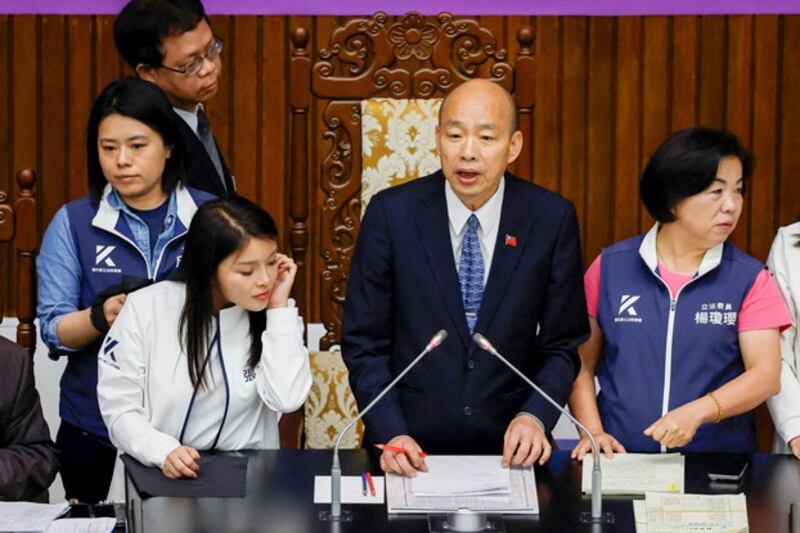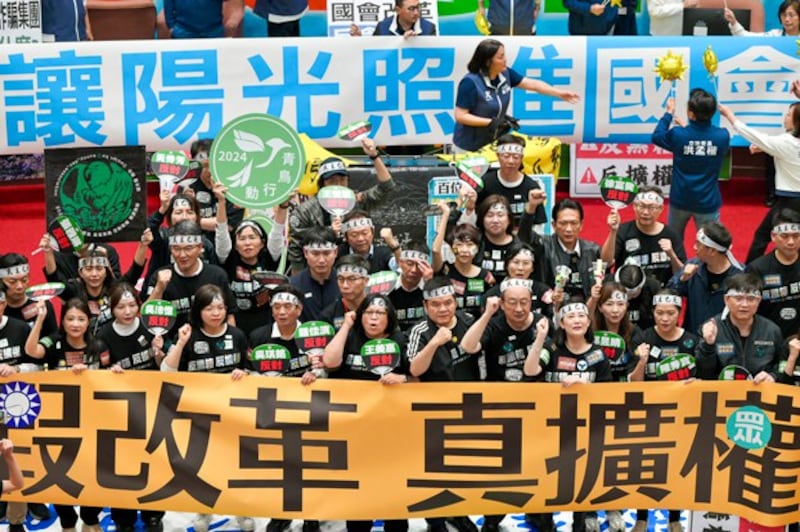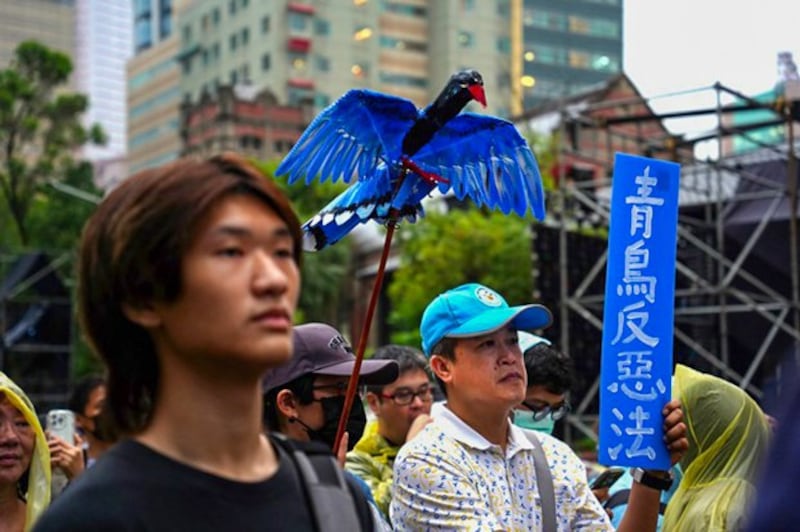Taiwan's premier said on Wednesday that the administration will consider sending back new legislation that could weaken the power of the democratically elected president, sparking fears of growing Chinese influence in the island's political life, to lawmakers for review.
Premier Cho Jung-tai said Lai's administration, known as the Executive Yuan, will be looking at the possibility of bouncing the new legislation back to lawmakers for review, based on the Additional Articles of the island's constitution.
"When the Executive Yuan receives the documents from the Legislative Yuan, it will deliberate carefully over how the constitutional organs can best fulfill their responsibilities," Cho said in comments reported by Taiwan's Central News Agency.
Taiwan's Democratic Progressive Party, or DPP, which holds the presidency but which has lost control of the legislature, has called for a constitutional interpretation of the controversial amendments.

Pro-China lawmakers voted through a package of legislative amendments as tens of thousands of people protested outside the Legislative Yuan on Tuesday, giving themselves new investigative powers, the power to hold hearings and the ability to sanction officials if they don't comply with requests.
One amendment requires the president to report to the Legislative Yuan annually and to submit to questioning by lawmakers.
'Bluebird Movement'
Protesters, some of whom held up effigies of blue birds, pushed large balloons into the legislature on Tuesday night emblazoned with the "Citizens Defend Democracy" and "Reject Chinese Interference in Politics," while one DPP lawmaker threw a paper aircraft made from blue paper at the podium.
But the amendments were passed by the pro-China Kuomintang and the Taiwan People's Party, which together command a majority of 60 out of the 113 seats in the Legislative Yuan, as crowds gathered in protests that are being dubbed the "Bluebird Movement."
President Lai Ching-te's DPP, which holds just 51 seats following January's general election, has called for a constitutional interpretation of the new laws, which critics say will open up the island's government to manipulation and sanction by politicians with close ties to Beijing.
Lai called on Beijing in his May 20 inauguration speech to stop threatening his country, and respect the will of its 23 million people, the majority of whom have no wish to be ruled by the Chinese Communist Party.
National Security Bureau Director-General Tsai Ming-yen warned on Wednesday that Beijing is planning to take advantage of the DPP's loss of control over the legislature by stepping up contacts with lawmakers, local politicians and religious and business groups, using a strategy of exchanges with friendly associations while attacking those that refuse to cooperate.
Beijing vowed in January to step up its efforts to achieve "peaceful unification" with the island after Taiwanese voters in January elected Lai, Beijing's least favorite candidate.

Tsai said his agency is "closely monitoring developments, having obtained both public and secret intelligence about relevant policy discussions inside China’s establishment," Taiwan's Central News Agency reported.
'Taiwan belongs to all'
The Kuomintang, or KMT, whose former president Ma Ying-jeou recently met with Xi Jinping, says the new laws will allow the island's democracy to be more transparent and accountable, after eight years of domination by the ruling DPP, immediately announcing it would set up a "private special investigation team" to go after "corrupt" DPP officials.
Kuomintang caucus convenor Fu Kun-chi told journalists: "Taiwan doesn't belong to the Democratic Progressive Party, nor does it belong to Lai Ching-te. Taiwan belongs to all of its people."
"Starting today, we will expose every instance of Democratic Progressive Party corruption, one by one," said Fu.
DPP Legislative Yuan caucus leader Ker Chien-ming said Tuesday's vote was "a day of national humiliation," accusing parliamentary speaker and pro-China politician Han Kuo-yu of failing to abide by procedural justice in his handling of the legislative amendments.
"We will definitely propose a constitutional interpretation, which can only be put forward after the president's announcement," Ker said. "The DPP will abide by the legal requirements and procedures for constitutional interpretation."
'Last breath'
A protester who gave only the nickname Chili told Radio Free Asia outside the Legislative Yuan on Tuesday night: "I feel very heavy, and sad, very sad. The [KMT and TPP] totally ignored the rules of procedure and refused to discuss the issue with the Democratic Progressive Party."
He said protesters would start issuing recall proceedings for KMT and TPP lawmakers from their respective constituencies.
Many in the crowd were refugees from an ongoing crackdown on political dissent under Chinese Communist Party rule in Hong Kong.

"I may not be able to achieve anything special, but I will keep on coming out, time and again, as a person who is from Hong Kong and Taiwan," a protester who gave only the nickname Ah K for fear of reprisals told RFA on Tuesday night.
Another Hong Konger said she had brought her children along to "take a last breath of free and democratic air before their eyes were blindfolded" by government propaganda on their return.
Wu Jui-jen, an associate history researcher at Taiwan's Academia Sinica, called on protesters to "go back home, go back to school, go back to work, and start organizing and acting, learning and discussing, and build a movement to strengthen civil society."
Wu said he expects pro-China lawmakers to boost trade ties with China, amend national security legislation to dismantle the island's defenses against political infiltration, and even sign the island up to Chinese President Xi Jinping's Belt and Road international influence and infrastructure program, and begin the process of controlling Taiwan's economy, society and culture.
Translated by Luisetta Mudie . Edited by Roseanne Gerin.
